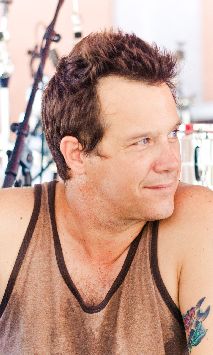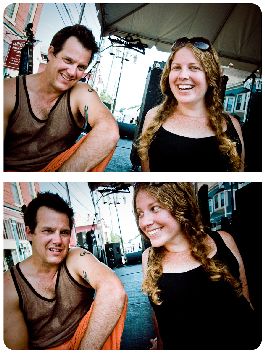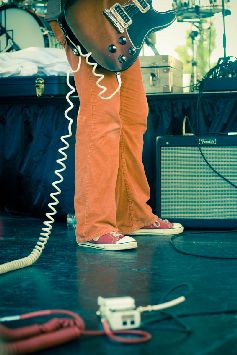social bookmarking tools:
 |
|
| Available RSS Feeds |
|---|
 - Top Picks - Top Picks |
 - Today's Music - Today's Music |
 - Editor's Blog - Editor's Blog
|
 - Articles - Articles
|
Add Louisville Music News' RSS Feed to Your Yahoo!
|

SIX DEGREES (OR MORE) OF PETER SEARCY
By Tim Roberts. Photos by Laura Roberts
So let's start the list. It's not conclusive, is limited only to music, and doesn't include anyone whose house he has painted or those whom he has helped find their first home. And anyone reading it might ask, "Hey, where's my name?" To that, a line from T.S. Eliot's "Rhapsody on a Windy Night" might provide a thoughtful response: "The memory throws up high and dry / A crowd of twisted things. . . ." Which is to say, "Sorry, pal, can't remember everything."
This would be much easier to plot as a graph, but name-dropping in print is much more fun. Take a deep breath, dive in. . . .
Peter Searcyplayed in Squirrel Baitand Fancy Pantswith Ben Daughtry, who later became part of the famous lounge-soul outfit called Love Jones, featuring Barry Thomas, Jonathan Palmerand Chris Hawpe. While out in California, Barry Thomasplayed in an alt-country band called The Cousin Lovers. Searcy had also played with Louisville's Big Wheeland Starbilly. His breakthrough solo debut, Could You Please and Thank You,was on the now semi-defunct Time Bomb Recordings, which also released CDs from the Reverend Horton Heat and Sunny Day Real Estate. It was recorded and produced by Tim Patalanat his family's horse farm in Michigan. Patalan also produced a tight blast of power pop called Imperial Comet Hourin 1996 from a British band called Mexico 70, which was one of the first CDs reviewed by someone currently still writing for the fine publication you are now reading. Some time later, Chris Hawpe(from Love Jones) joined Searcy's pickup band for a few gigs around the city he'd play, in between house closings. Searcy also self-produced and recorded a pair of releases, and his latest, Spark,was produced by Todd Smithand released on his Label X, where his label mates included The Muckrakers, Digby, and Code Red. His current band's lineup includes Eric Whorton of El Roostarsand Brigid Kaelin, both of whom also played on Spark(and who were, in a band or as solo artists, also had stories about them written by that same character who wrote the review of the Mexico 70release). Meanwhile, Jonathan Palmerof Love Jones(remember him way back earlier in this paragraph?), who now works for Columbia Records, got Searcy's song "I Believe," from Spark,used on Oprah Winfrey's "The Big Give" and the NBCshow "Lipstick Jungle."
"Oprah," Searcy called out, "where's my damn money?"

Several in the crowd guffawed. Searcy has just finished playing "I Believe," the song used in Winfrey's "The Big Give" TV show. Apparently she can give away new cars to a studio audience, but she has a problem digging out a few spare dollars for rights to use a song. Maybe all Searcy had to do was reach under his seat. That's always where Winfrey hides the surprises for the people who come see her show's tapings.
A comfortable breeze kicked away some of the late summer heat during the Original Highlands Festival on a sunny Saturday afternoon in mid-September. The breeze was only a teasing foretaste of what was to come, like how the smoothest of Bourbons coats your tongue and throat with warmth before it flares up like a new sun when it hits your gut, as the remnants of Hurricane Ike shoved its way up from Texas. Twenty-four hours later, the city would be nearly dark, trees would be uprooted and lying across streets, stoplights would stop working, and we all had to re-learn how four-way stops worked, all from the storm's leftover winds.
A long stretch of Baxter Avenue was blocked off, from near Broadway up to Highland Avenue. Tents on either side of the street housed vendors selling everything from organic dog food to yard art. The metal patio tables in front of all the bars and restaurants in that stretch were full. Music stages were set up at opposite ends. Searcy played on the stage near Broadway with his current band: Eric Whorton on guitar, Adam Lowey on bass, Ryan Murphy on drums and Brigid Kaelin on keyboard and accordion.
Earlier in his set, a trio of boys, about three to four years old each, scurried around in front of the stage to his music. "It's too good a time not to tear things up," he said about them in between songs. For the final song of his set, Searcy did his rendition of Rod Stewart's percussive, bluesy cover of "(I Know) I'm Losing You," which itself (speaking of six degrees of separation) was a cover of a Rare Earth song originally performed by The Temptations. During the drum solo, he pounded his chest with a tambourine. It was kinetic, the same kind of power and energy you might find in a brief thunderstorm, the ones that pop up on sweltering afternoons, then vanish. And the boys scampering earlier in front of the stage were probably feeling the pop sparkle that also runs behind all of Peter Searcy's music. The sound doesn't drive toward rage like thrash metal. Instead, it stirs motion, whether it's dancing, bobbing your head, or scrambling around like a toddler. The Searcy sound makes you want to move, a consistent vibe that's been present in all his solo efforts since 2000's Could You Please and Thank Youon the now somewhat inactive Time Bomb Recordings, and carries through to Spark.
"Time Bomb went under," Searcy said of his experience with the label. "I was kind of left waiting in a holding pattern for a couple of years, waiting for them to find me a [label] home. Then the guy who ran the label decided he didn't want to find a home after about a year-and-a-half, so he kind a left me hanging out there in space."
Could You Pleasewas one of the several Time Bomb had released in 2000, and Searcy went on a long national tour for it, co-sponsored by Jolly Rancher candy and Hard Rock Café. In an unexpectedly short time, all the excitement had burned itself away as Time Bomb struggled to keep its suddenly large roster of artists profitable. Hard to do in the early years of the 21stcentury, when the industry was being tunneled under by file-sharing systems. A new pipeline had opened, and music was no longer confined to data on a shiny little disc stored in a flat plastic box that had the sturdiness of a light bulb.

Even though the Time Bomb fizzled out (but still remains as an imprint to distribute music by Social Distortion and Mike Ness), Searcy continued making music. "I recorded Trust Fallsindependently with the hopes of finding it a home, but ultimately we never found it a good enough place that made me think couldn't do just as good a job releasing it ourselves. I might have been wrong about that because I'm not much of a businessman."
An odd thing to say, given that Searcy is also a licensed realtor who specializes in getting his clients their first homes ("I take care of business for other people better than I do for myself," he explained), a job he moved into after a stint painting houses.
"My joke about being a musician" he said, "is either you're good at waiting tables or painting houses. I got good at panting houses, which took me to selling them."
Now at 40, in the eight years that have elapsed since Could You Please and Thank Youand the last time a story on him appeared in this publication, Searcy has been married twice, divorced once, gone from being a house-painter to a realtor and has released three CDs. But despite the few years that have passed, a youthful energy flares behind Searcy's eyes, and it's same kind of energy still present in his music. Fitting, then, that his most recent release is titled Spark.
"So much has changed in eight years," he stated. "In 2000, that's when the industry really started to change. The Internet has changed it a lot. CD sales have gone down every year. File sharing has hurt a lot of bands. But has helped some people. Just depends on who it is. I think it hurts me. To be able to release stuff, I've got to sell records. If for every one I sell, 10 people download one. It's kind of a tough situation. I do like the fact that you can sample songs through iTunes. Ninety-nine cents for a song is nothing to pay. Still, at the same time, artists don't make very much off that.
"It's tough when you struggle, and anybody who's not huge is struggling. It's a tough place to be. It costs a ton to tour. Gas has gone up. People don't go out as much to see bands. So the big question is why do I do it? I don't know what else I'd do."
In a business that celebrates the Hot Flavor-of-the-Minute acts, endurance and longevity are acknowledged, but sometimes rarely respected. Searcy is one of the many Louisville musicians who, despite his relatively young age, has both. Starting with his years learning the cello, playing in the underground punk scene in the mid-1980s with Squirrel Bait, venturing into pop with Big Wheel and Starbilly a few years later, then charging into the new decade as a power-pop notable, and maintaining that even as he took a professional career tilt toward selling real estate. And through that career, he has connected with the lives and careers of many other musicians in the city. If a performer needs a certain sad or emotional element in a song, Searcy and his cello are brought in. Need a song that documents how someone is reacting to life unfolding around him? Use one of Searcy's.
"I've always written things from my heart," Searcy said. "I'm not a great situational songwriter like Bruce Springsteen. I mostly document what's going on in my life and in the lives of my friends around me. So I'm wrestling with that a little bit. It's just gotta be honest, and I've been kind of in a rut trying to figure out where I'm coming from. I don't have any kids or anything. Exciting songs are about peoples' heartaches and their drama. But now I'm trying to eliminate as much drama from my life as I can."
His strongest connection to another Louisville musician is now with Brigid Kaelin. He's now part of her band's lineup (just as she is with his), and they're developing the kind of professional partnership that was depicted by the duo in the movie Once: one of synergy, mutual goals and complimentary sounds.
"It's so mutual," Searcy said of the relationship. "The thing that I love most about music is that I've made all of my best friends through it. It's a common bond that you have that's there. [Brigid] and I are as thick as thieves. We constantly laugh. We tour a lot together. She plays piano for me when I go out and do my stuff. I play bass for her and back her up. And I don't think we've ever met a situation where we're just cutting up and laughing about it."
They have spent the past several weeks on a tour of Europe, with stops in London, Manchester, Liverpool, Glasgow (Scotland, that is), Edinburgh, then over to Belgium, with just their guitars, her accordion, his cello, and whatever piano is available at the spot where they played. They traveled light, and their sound will be stripped down, Bohemian, acoustic, and unplugged.
But as close as they are professionally, and as much as they engage each other on the stage with banter and lots of humor, does anybody wonder if their relationship is deeper?
"I'm sure we confuse people all the time," Searcy said. "Just because we play together doesn't mean we lay together. People think that if a woman's making music, they assume that she has to be sleeping with somebody in the band. And I think that is so degrading to the talent that she has, and the talent that a lot of women have. She could hold her own in any situation. Once you hear her accordion on a slow song, it's over with."
Since music is never created in a vacuum, making a commitment to a partnership with another musician, or group of musicians, or even to the behind-the-scenes people might be the most transparent aspect of the music business. According to Searcy, that transparency makes things seem a little too easy for those who think all you need is a guitar, a few practice sessions with Rock Band on the PlayStation, and an American Idol voice to break into music.
"Being in a band used to be super-special," he stated, "because there weren't that many. Now everybody and their brother is in a band. I think you can blame MTV and reality shows for the glut of bands that we have. Not everybody should pick up an instrument and play it. That sounds harsh, I know. I just think the images get projected out there about what can happen with music.
"But there's nothing like the joy of being in your first band. So I wouldn't want anybody to not experience that."
The difference seems to be in the commitment to getting the best sound possible before committing it to some kind of permanent form in a studio.
"When I first started going into the studio, you were rehearsedlike you wouldn't believe. You were paying by the hour, there weren't very many studios, and it was a huge deal to go in and record. You hit it on the first or second take because you were so rehearsed."
So in this era of free, open-source audio production software and portable equipment, isn't the need to work in an actual studio with a producer a little archaic? Searcy seems to think not.
"I've got a studio and I'd like to start producing more," he said. "It's tough in this town. I don't think all these people have a grasp on what a producer is supposed to do, and a lot of people think they can do it themselves. In talking with some other producers and studio owners, they're seeing a backswing now. It was that all the studios were getting no work because everybody had their ProTools at home. But I think people are figuring out now that the reason their home recordings don't sound like albums is because they don't have certain pieces of gear or knowledge. And they have five-minutepop songs. A producer comes in and can trim away some of the fat and highlight the things that they're missing, and help bands make decisions they can't make because of internal struggles they inherently have."
It's clearly obvious that Searcy loves playing in a band, is hip to the struggles it can have, and having experienced, for more than 20 years, all the highs (getting signed to a label and having it support him on a nationwide tour) and lows (getting dumped by that label and having to limit his gigs to local spots while developing a different professional career) it can bring about gives him a mentor's wisdom. That and a good set of ears for what can make a song snap, plus all the connections (six degrees and more) he has made in that time, can put Peter Searcy either in a seat behind the control board in a studio or in front of the microphone on a stage. And that gives him personal and professional flexibility.
"Lately, the world has given me some things to write about," he said. "I'm also figuring out musically what direction I'm going in. I thought Sparkwas a big, lush-sounding, almost-70s-rock-sounding album, and I always wanted to make that kind of album. Now I want to make a really simple rock album. I want to do more of the guitar playing on it, not because I'm a great guitar player, but I definitely have some action in my fingers. I kinda want to explore that a little bit more."
Still, he's always drawn back to playing in a band.
"It's a different kind of fun you have. When you're a solo artist, there's not an all-for-one thing. There's nothinglike being in a band, having that feeling of it's us against the world. Any band that can pull that off I think is great. And they truly have something unique."
Get your connections to the world of Peter Searcy at www.petersearcy.net.
